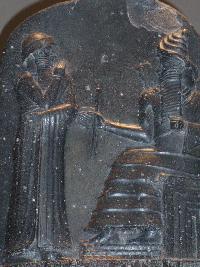Arabic translation & transliteration of ancient names Thread poster: Aurora Favero
|
|---|
Good morning to everybody!
I am a graduate in Arabic Studies, and I have been following since long time ProZ and its forums: they're extremely useful for anyone who likes languages... and anyone, like me, who hope to become a professional translator one day! 
Now I am in the throes of doing my first Arabic translations, and I am working, together with an Arab native-speaker friend of mine, in order to tra... See more Good morning to everybody!
I am a graduate in Arabic Studies, and I have been following since long time ProZ and its forums: they're extremely useful for anyone who likes languages... and anyone, like me, who hope to become a professional translator one day! 
Now I am in the throes of doing my first Arabic translations, and I am working, together with an Arab native-speaker friend of mine, in order to translate from Italian to Arabic a small book concerning the ancient history of Middle East and Islamic civilization.
Both me and my girlfriend are two beginners in translation: we are perfectly aware of how much we have to learn in this field, so we just decided to combine our efforts and do this job just to get some experience, and learn as much as possible.
Anyway, we met some difficulties that we really do not know how to face, so I hope in some suggestions from your part, since all of you are much more experienced than me...
Well, the biggest difficulty we met is the following: we often meet the latinized names of ancient personages or cities, and sometimes we don't know how to trace the correct Arabic translation, if any. We are actually using a very good encyclopedic dictionary called "Al-Munjid", but it cannot help us in all cases. Researches on the net are often unsuccessful, and if I get few results, I am not sure they're 100% reliable. Do you know any Arabic glossary on the web?
Just few examples, to be more clear. When we find in our source text names like "Averroé", "Avicenna", "Maimonide" or "Arzachel", we know they are the latin translations of important personages of the Arab history, whose real Arab names are "Ibn Rushd", "Ibn Sina", "Musa ibn Maymun", "Ibrahim az-Zarqali" and so on.
But what should we do with names like "Baramandano" (latin name of the ancient Ghana Empire king) or "Monomotapa" (king of ancient Zimbawe)? How can we know if they have their own Arabic name or if we have just to transliterate them into Arabic? Or what to do with names of ancient kings like "Ruggiero il Normanno", "Porfirogeneta" and others?
And what should we do, for example, with Chinese or Indian city names (like "Sri Vijaya" or "Chang An")? Do you suggest me to follow particular transliteration rules?
Please forgive me for my long message, but these issues really puzzle me a lot... Thanks in advance for your help!
Ms. Aurora Favero
[email protected] ▲ Collapse
| | | |
Nesrin 
United Kingdom
Local time: 20:06
English to Arabic
+ ...
| A number of things you can do... | Nov 18, 2004 |
Good luck, Aurora, that sounds like one big job you're starting with!
I don't think you will find all the answers you need on the internet (certainly not in this message)!
I also don't think there is one 'staple' method you can follow, but personally I would do the following:
In the case of names like Avicenna (which you have figured out yourself), there is no question that you should do everything possible to find the original Arabic name. Luckily, Arabic names are not ... See more Good luck, Aurora, that sounds like one big job you're starting with!
I don't think you will find all the answers you need on the internet (certainly not in this message)!
I also don't think there is one 'staple' method you can follow, but personally I would do the following:
In the case of names like Avicenna (which you have figured out yourself), there is no question that you should do everything possible to find the original Arabic name. Luckily, Arabic names are not usually transcribed in such a bizarre way, and you won't have to spend hours looking through Arab history books.
In the case of less well-known non-European, non-Arabic names like Monomotapa, or Chang An, I think I would just go ahead and write it in Arabic as pronounced in English or Italian.
As for European names like ""Ruggiero il Normanno", I would be careful not to transcribe them as you find them in your Italian book. "Ruggiero il Normanno", for example, is as I understand "Roger the Norman". I would therefore assume that if he was ever mentioned in Arabic works of history, you would find his name spelt روجر or روجيه and not روجيرو. This is just an example and I may be wrong, but usually you will find that either the English or the French pronunciation has been adopted.
In any case, I think you cannot complete this job properly without consulting some standard Arab history books (in Arabic!)
Anyway, feel free to come back to this forum for other more specific questions!
Nesrin
Aurora Favero wrote:
Just few examples, to be more clear. When we find in our source text names like "Averroé", "Avicenna", "Maimonide" or "Arzachel", we know they are the latin translations of important personages of the Arab history, whose real Arab names are "Ibn Rushd", "Ibn Sina", "Musa ibn Maymun", "Ibrahim az-Zarqali" and so on.
But what should we do with names like "Baramandano" (latin name of the ancient Ghana Empire king) or "Monomotapa" (king of ancient Zimbawe)? How can we know if they have their own Arabic name or if we have just to transliterate them into Arabic? Or what to do with names of ancient kings like "Ruggiero il Normanno", "Porfirogeneta" and others?
And what should we do, for example, with Chinese or Indian city names (like "Sri Vijaya" or "Chang An")? Do you suggest me to follow particular transliteration rules?
▲ Collapse
| | | |
| Literary/Academic Translation | Nov 20, 2004 |
Hello Aurora,
I don't know if I can be of that much help to you as I'm an English translator and I seldom translate in the opposite direction; however, the fundamentals of academic translation are more or less fixed.
Different types of translation demand different abilities/research skills from the translator and academic/literary translations are the most demanding, so good luck!
As Nesrin pointed out, the internet really is very limited as far as resources are concerne... See more Hello Aurora,
I don't know if I can be of that much help to you as I'm an English translator and I seldom translate in the opposite direction; however, the fundamentals of academic translation are more or less fixed.
Different types of translation demand different abilities/research skills from the translator and academic/literary translations are the most demanding, so good luck!
As Nesrin pointed out, the internet really is very limited as far as resources are concerned, particularly if you're looking for authentic materials.
You may also find that your translation takes a lot longer to do than other commercial translations, and that again is a requirement of the type of translation you're undertaking.
A rather good, general reference is "Al-Mawrid Arabic-English Dictionary" (although I like the Al-Munjid too) which has a list of famous Arab/non-Arab personalities at the back with short biographies and their names in Arabic and English. I find it useful sometimes when I'm not sure what name an Arabic transliteration is supposed to be in English.
For the kind of translation you're doing, you'll probably find that your university library (if you still have access to it) is your most valuable friend, as it will have most of the resources you need. The "Encyclopaedia of Islam" in both Arabic and English (I believe it also exists in some other languages) is also a valuable reference, as it includes not only the names of people and places from Islamic history, but also from lands the Muslims have encountered/invaded/travelled to. You could also try to cross-reference your attempts at transliterating names into Arabic with how they are written in Ibn Al-Athir's "Al-Kamil Fil Tarikh (الكامل في التاريخ)" which is invaluable for Islamic/Arab/ancient history in Arabic.
About which language to use for transliteration, you probably will find that English is the one preferred in Arabic. You mentioned Indian and Chinese names; these are often impossible to transliterate into English, let alone Arabic, so transliterating Mao Zedong (the English version!) into Arabic is quite acceptable.
Another very important part of your research, which would probably be invaluable to you, is to read up a lot about the history of the period involved in Arabic - i.e. lots of history books in Arabic. That will give you a very good idea of HOW history is written in Arabic (genre) and also what the general rules of transliteration are in this case.
One final point (if you don't mind): as I have already said, academic translations are one of the most demanding kinds; it may be an idea to get a former university lecturer or academic Arab friend specialising in history to help you along as an advisor. Not only would this be invaluable to you for your first project, but specialist expertise may be required, depending on the field and depth of the material you're translating.
I think that's even longer than your post!
Feel free to ask for more advice if you need it.
Buona fortuna
Aisha
[Edited at 2004-11-21 20:28] ▲ Collapse
| | | |
Parrot 
Spain
Local time: 21:06
Spanish to English
+ ...
| Get it clear | Nov 22, 2004 |
Aisha's right, start with the encyclopedia. "Monomotapa" is well-documented as a title, not a proper name. Sri Vijaya is a Malay (only culturally Indian) empire, with variable borders over time, so consulting that particular period of history will help (Arab relations with Indonesia during the middle ages).
| | |
|
|
|
Aurora Favero
Local time: 21:06
English to Italian
+ ...
TOPIC STARTER
To Nasreen, Aisha and Parrot
Thanks a lot for you precious suggestions and support, all of you have been very kind! I’ll do my best to put into practice your recommendations and solve this messy situation...
Have a nice day!
Aurora
شكرا جزيلا
| | | |
| Sri Vijaya is an Indian Empire | Jun 5, 2005 |
Parrot wrote:
Aisha's right, start with the encyclopedia. "Monomotapa" is well-documented as a title, not a proper name. Sri Vijaya is a Malay (only culturally Indian) empire, with variable borders over time, so consulting that particular period of history will help (Arab relations with Indonesia during the middle ages).
YOU ARE SO WRONG!!
| | | |
| To jigsaw1975: Please observe professional courtesy | Jun 5, 2005 |
jigsaw1975 wrote:
YOU ARE SO WRONG!!
As this is you first Forum posting, you may be unfamiliar with the Forum Rules of Etiquette:
http://www.proz.com/forumrules/
Rule No. 5 states:
5. No shouting
"Shouting" is considered impolite and is discouraged; lower case should be used unless there is a reason to capitalize.
Your input is welcome, regardless of how much it disagrees with the input of others. However, if you disagree with someone's opinion, we expect you to present your disagreement professionally, both in content and in tone. Simply telling someone "You are so wrong," all in caps, followed by two exclamation points, fails to meet this standard, and also fails to add anything of value to the discussion, which is the whole purpose of engaging in the discussion (we hope). A much more appreciated approach would be to positively state your own opinon on the issue.
ProZ.com is a site for professionals, and we would like the Form discussions to reflect that spirit.
Thank you for your support.
[Edited at 2005-06-05 19:31]
[Edited at 2005-06-05 19:31]
| | | |











